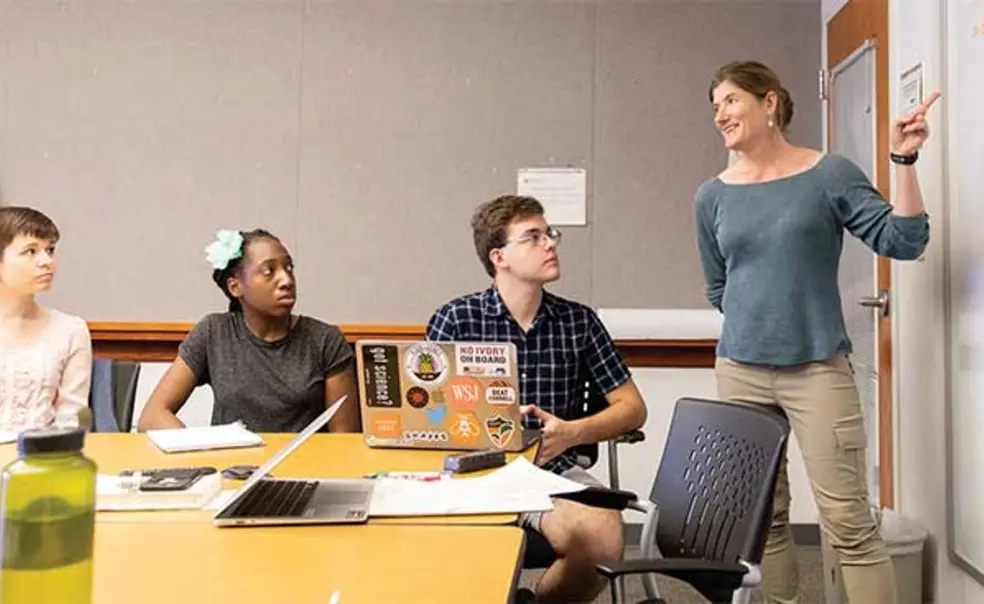Toward a More Sustainable Future
Our planet faces urgent and complex environmental problems that, if unaddressed, threaten to do incalculable damage to human well-being and the natural world. Princeton is responding to these challenges on its campus, through its research, and in its classrooms.
Last month, Princeton built on a decade of progress toward cultivating a sustainable campus by releasing a new Sustainability Action Plan to guide campus operations and community behaviors now and for years to come. The plan aims to establish best practices that can serve as models for individuals and institutions around the world.
Informed by careful, evidence-based analysis, the Sustainability Action Plan identifies ambitious but achievable goals. For example, Princeton aims to reduce greenhouse gas emissions to net zero by 2046, the University’s 300th anniversary. The plan also contains demanding targets to reduce water usage, encourage alternatives to singleoccupancy- vehicle commuting, and drive down the amount of non-recyclable waste.
One hallmark of the plan is its commitment to spur innovation that will provide solutions for our campus and beyond. Though the plan sets realistic goals, it also recognizes that we have not yet identified all of the methods required to hit our targets. Such “innovation gaps” stimulate creative problem solving. For example, the 2008 Sustainability Plan employed an innovation gap in its goal to reduce CO2 emissions to 1990 levels by 2020. We have nearly closed that gap and expect to do so fully by 2020.
The Sustainability Action Plan recognizes Princeton’s responsibility to conduct its campus operations consistently with its own long-term goals and with the ethical obligations of all citizens and institutions. Princeton’s most meaningful contributions to the health and vitality of the planet will, however, undoubtedly come from our teaching and research.
The Princeton Environmental Institute, which this year celebrates its 25th anniversary, has long been a focal point for Princeton’s efforts in this area. Centered upon the environmental sciences but aggressively interdisciplinary in its teaching and research, PEI draws collaborators from many other units around campus, including the Andlinger Center for Energy and the Environment and the Woodrow Wilson School of Public and International Affairs. The University is now launching a major initiative to build upon PEI’s many successes and increase its capacity to attack 21st-century challenges.
PEI’s scholars are already making pathbreaking discoveries in fields such as climate science, biodiversity, food security, water conservation, and environmental engineering. For example, PEI Director Michael Celia is a leading expert on carbon capture and sequestration. The Theodora Shelton Pitney Professor of Environmental Studies and professor of civil and environmental engineering, Celia uses mathematical models to study carbon mitigation strategies and their potential effects on natural resources.
Stephen Pacala, the Frederick D. Petrie Professor in Ecology and Evolutionary Biology, studies plant ecology, biodiversity, and the global carbon cycle. He serves as the co-director of the Carbon Mitigation Initiative, a prolific research collaboration with BP that has pioneered solutions to climate change for nearly two decades.
As an associate professor of ecology and evolutionary biology, Corina Tarnita uses empirical data to decipher mystifying patterns that emerge in nature. Her analyses illuminate properties of complex biological systems at scales ranging from bacteria to insects to human populations.
Professor Michael Oppenheimer examines the effects of global warming on ice sheets and sea levels. Oppenheimer, the Albert G. Milbank Professor of Geosciences and International Affairs and the Princeton Environmental Institute, has utilized his research as a member of the Intergovernmental Panel on Climate Change, which won the 2007 Nobel Peace Prize.
PEI’s interdisciplinary spirit extends to our classrooms as well. For example, PEI’s “The Environmental Nexus” class offers students four different perspectives on environmental problems. Professor Pacala leads the scientific dimensions; Melissa Lane, the Class of 1943 Professor of Politics, guides ethical discussions; Marc Fleurbaey, the Robert E. Kuenne Professor in Economics and Humanistic Studies, addresses political and economic considerations; and Rob Nixon, the Thomas A. and Currie C. Barron Family Professor in the Humanities and the Environment, examines how the arts can catalyze social change.
To extend Princeton’s leadership, the University plans to raise funds for a new building that will provide the laboratories required for cutting-edge environmental research and will serve as a central hub for scholars and students engaging with environmental issues. The state-of-the-art facility will house PEI and faculty members in ecology and evolutionary biology and geosciences, and it will be designed to facilitate work across methodological boundaries.
At the same time, we will also raise funds to support teaching and research initiatives, and to facilitate collaborations with both academic and non-academic partners beyond our campus. By forging new networks and convening critical conversations, we hope to bridge gaps between scholars and decision-makers, thereby improving the quality of information and policy across multiple sectors.
At this moment of environmental crisis, Princeton has a responsibility to lead through teaching, research, and sustainable practices. I am proud of what this University’s faculty, students, and staff are doing already, and I look forward to working with them to accomplish even more in the years ahead.












1 Response
Jim Mosley ’77
6 Years AgoWhere Our Obligations Begin
The president begins: "Our planet faces urgent and complex environmental problems that, if unaddressed, threaten to do incalculable damage to human well-being and the natural world." He then describes an admirable list of initiatives to reduce the carbon footprint of the campus and to increase research programs in environmental studies. But nary a mention of the incredible impact that could be made in key industries and on the national conversation by re-investing all fossil-fuel industry holdings in our endowment fund into renewable-energy investments. Do the "ethical obligations of all citizens and institutions" not extend to our economic investments? Shouldn't that be where our obligations actually begin? "For what shall it profit a man, if he shall gain the whole world, and lose his own soul?" And then lose the whole world as well ...
And then there is this: My fossil-fuel-free mutual funds have returned 13.24% in 2019.